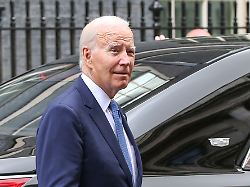Sensitive election issue
Biden apparently wants to slow down the pace of the electric car transport transition
February 18, 2024, 11:40 p.m
Listen to article
This audio version was artificially generated. More info | Send feedback
US President Biden wants to make the USA an electric car nation. Regulations, such as stricter emissions limits, should help. Now the White House should move away from this – because of the elections in November.
According to a newspaper report, US President Joe Biden wants to postpone the transport transition towards electric cars. The New York Times reported that no longer such stringent future emissions limits are planned, citing people familiar with the project. Manufacturers should no longer be required to quickly ramp up sales of electric cars. The issue is important in the US election campaign. The major manufacturers have warned of the destruction of jobs if the requirement for electric cars is imposed too quickly. This is tricky for Biden, who wants to be re-elected in November.
The state of Michigan is important in the fight for the White House and there are thousands of members of the UAW auto union. Its leadership has spoken out in favor of Biden’s re-election. His potential rival Donald Trump has made the denigration of electric cars a central strategy of his election campaign. Automakers and the industry association AAI have called on the Biden administration to slow the planned increase in sales of electric vehicles. They say electric technology is still too expensive for many US consumers. In addition, more time is needed to develop the charging infrastructure.
Tesla calls for stricter rules
AAI President John Bozzella said customer choice must be preserved. The major US manufacturers General Motors, Ford and Stellantis (Chrysler, Dodge, Jeep) had warned that they would not be able to convert their fleets quickly and profitably. A spokesman for the U.S. Environmental Protection Agency (EPA) said the draft final rule is under review. The agency is committed to a solution that is “easily achievable, ensures reductions in air and climate pollution, and provides economic benefits for families.” The manufacturers support an earlier idea of increasing the share of electric cars in new car sales to 50 percent by 2030. The government recently discussed 67 percent by 2032, up from currently less than eight percent.
The AAI warned that it could cost US automakers around $14 billion in fines if they fail to meet CO2 targets. The electric car pioneer Tesla is calling for stricter requirements. A market share for electric cars of 69 percent by 2032 and 100 percent by 2035 must become binding. Environmental groups also want stricter requirements. When it comes to electric vehicles, the USA lags behind Europe and especially China, where almost 30 percent of vehicles sold in January were electric cars or plug-in hybrids.
At Ford, for example, only four percent of total sales are of electric cars, at GM three percent. The problem for these brands is their reliance on the largest and least efficient vehicles, i.e. large pickups and truck-based SUVs. These represent 46 percent of GM sales and 59 percent at Ford.
